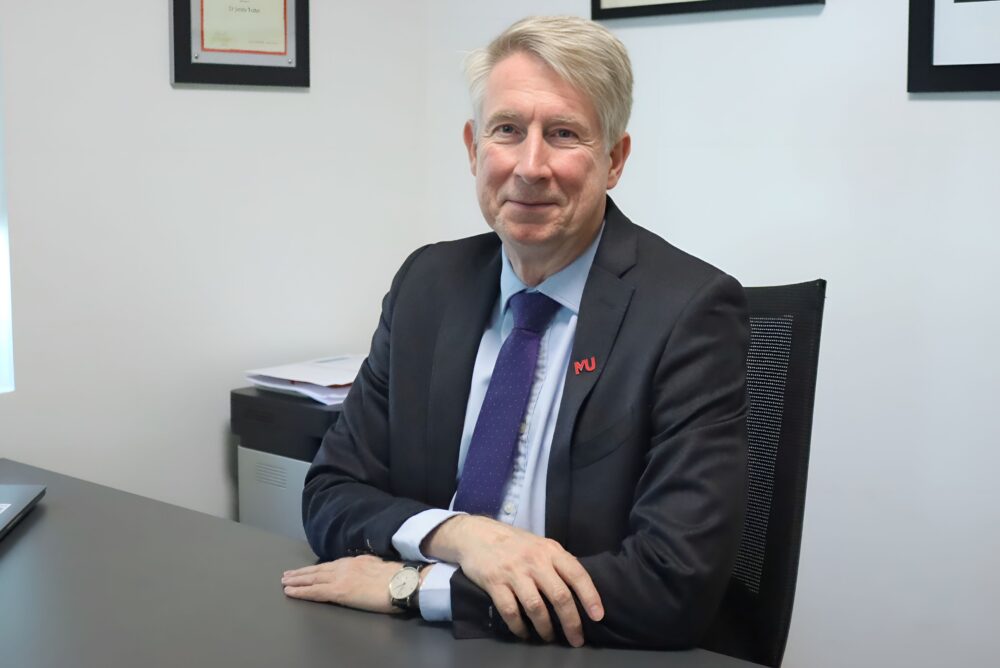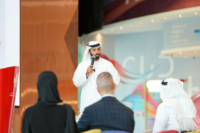Dr James Trotter is the Dean and Academic President of Murdoch University Dubai. He has held the position with the university since September 2017. He became a part of the Murdoch University community in 1994, the same year he joined Murdoch University Perth. Dr Trotter has held various academic and leadership roles, including Deputy Dean of the School of Arts, Associate Dean Learning and Teaching of the School of Arts, and a term as Deputy President of the University Academic Council. In addition, he has also served a term as an elected member of the Murdoch University Senate.
He holds a Masters and PhD from Emory University in Atlanta, US and has completed the General Management Programme from Harvard Business School in 2016. Dr Trotter’s academic area of specialisation is religions of the ancient Near East. Education Middle East spoke to Dr Trotter about the trends in higher education in the region, challenges posed by the evolving changes in technology, how the university keeps up with the changes in the industry and more.
How do you see the growth at Murdoch University ever since you took over as the Dean six years ago?
A lot has changed since I joined Murdoch University. For instance, our lecturers and students experienced a significant shift when we moved to a new campus in May 2020. The move has put us in a dynamic area that is a hub for business and education in the city. In addition to the relocation, we’ve also witnessed an increase in interest in Dubai as a study destination, resulting from the country’s long reputation as a safe country to live in with a strong international focus. Major events such as Expo 2020 and COP28 have also added new and exciting opportunities for our students to learn, grow and connect with industry leaders and professionals. Overall, the city has become one of the most influential global tech and innovation hubs, with the government heavily investing in developing and promoting start-ups and firms.
What significant changes have you witnessed in the UAE and the region in higher education during the past five years?
It’s hard not to notice the significant impact the COVID-19 pandemic had on the education sector. It was a challenging season that has forever changed the way we approach learning. To adapt to the situation, online learning was widely implemented as a necessity. However, now you can see that many institutions have incorporated blended learning styles that offer students the convenience to choose whether to attend their classes online or in person. Likewise, our postgraduate students also have the flexibility to make it easier for them to balance their day jobs and their studies. There is also a need for affordability. Studying at university is a big financial investment and often a luxury for most people, so there is always a need for flexible study options and scholarship opportunities.
What are the challenges posed by the evolving changes in technology in higher education?
There has also been a lot of discussion surrounding AI technologies. Naturally, this has sparked a lot of curiosity and interest in students. Advancements in AI technology present opportunities for efficiency and convenience; however, it has also raised certain ethical challenges in the academic sector, which involve students depending too much on generative AI technologies to write assignments. In response, we’ve implemented stricter policies to mitigate the students’ dependency on AI and introduced the Murdoch Academic Passport or MAP for short. MAP is a mandatory introductory course structured with the most up-to-date academic integrity research. Its aim is to provide students with the practical resources to meet the everyday challenges of being a student in the 21st-century classroom, including studying and learning with academic integrity. However, gradually down the line, there may be a greater need for implementing stricter ethical policies and systems to ensure the responsible development and utilisation of AI in a classroom.
What are your views on the latest policy changes and initiatives in the region in higher education?
The UAE continues to place special attention on developing the country’s education sector, and there have been a lot of initiatives by various organisations in the past years for university students to compete and showcase their skills. For instance, our Bachelor of Communication students actively participate in competitions led by the PRCA MENA, the world’s largest professional PR body. Significant events in the region, such as Expo 2020 and COP28, have also provided great learning and networking opportunities for our students. Going forward, we intend to consistently cultivate a learning environment that prioritises critical thinking, problem-solving and a comprehensive understanding of practical applications.
The increasing focus and support for research in the UAE is an important change for the future of universities and the nation. By facilitating more research locally, these policies will benefit the UAE and raise the profile and reputation of the higher education sector internationally.
Murdoch University seems to have a robust scholarship programme – can you tell us more about it.
Murdoch University Dubai offers a wide range of scholarships across all our programmes. To simplify the process, we’ve eliminated the need to apply separately for a scholarship and centralised the assessment process by determining a student’s eligibility based on submitting their previous academic results. Applying for university is an important step in a student’s life to start their journey towards their career goals, which can be quite stressful. We try to simplify the process to support the students in the best way possible and lead them to a path that best suits their needs. Besides Academic Merit Scholarships, we also grant discounts and bursaries to eligible applicants to further lighten the financial load.
How diverse is your student population?
Murdoch University Dubai has a diverse range of students from more than 50 different nationalities. The UAE is a melting pot of different cultures, and you can see this reflected in the student bodies of many academic institutions. Having that touch of diversity truly enhances the student experience because it allows you to be more culturally aware and knowledgeable about the world.
Being in the Middle East, how do you blend local culture with global perspectives in your teaching?
All the courses offered at our Dubai campus are particularly structured to prepare our students for employability in a constantly evolving world. We’re Australian at heart and grateful to call Dubai home. In other words, our curriculum closely mirrors that of our main campus in Perth, Australia so our course materials taught at our Dubai campus are the same as those provided on our main campus. That said, all of our local academic staff contextualise the material for our Dubai context. Our academic staff have many years of industry experience in the UAE and the GCC. They are able to draw on this experience to bring examples from the local and regional context into the classroom.
How does your curriculum keep up with the changes in the industry? With the rapid changes in technology, how do your programmes prepare students for an AI future?
In all our discipline areas we work closely with industry partners to provide our students with current industry knowledge and internship experiences. These partnerships are also vital to our academic staff to maintain their knowledge of the latest developments in the industries relevant to their teaching portfolio. These partnerships will also be important as we continuously develop our curriculum to the changes required by AI. Understanding how industry is and will employ AI in their daily activities will provide key information in how we need to prepare our students for an AI future.
What are the top in-demand courses in the region? Has Murdoch University Dubai introduced any new courses in the past two years?
Murdoch University Dubai offers a comprehensive range of degrees and majors, but recently we’ve noticed a fluctuation of interest in IT degrees, particularly in AI. In response to this trend, we’ve introduced the Bachelor of Information Technology in Artificial Intelligence and Autonomous Systems, which covers various topics, such as machine learning, data analytics, computer vision and robotics, giving students a comprehensive understanding of the latest AI technologies. Regarding the UAE, we can’t say specifically what’s been a popular choice. Still, you will notice that most institutions, particularly in DKP (Dubai Knowledge Park), offer various courses falling under business and commerce, computer science, engineering and mass communication.
As someone in a leadership role, what advice do you have for educators aiming for similar positions?
I think self-reflection and the development of interpersonal skills is the most important preparation for leadership. If someone is being considered for a leadership role, they generally have a very good understanding of the education industry and the operation of a campus. That understanding is vital but is insufficient for good leadership without a good understanding of yourself and strong interpersonal skills.
You must understand your own strengths and weaknesses to be a good leader. No one can be equally good at every aspect of work or life. We particularly need to understand where we have weaknesses so that we can work to strengthen those areas, but also so that we can rely on other members of our team who might have strengths where we have weaknesses. Leadership is communal not individual. In education we are extremely fortunate to have an incredibly intelligent and highly educated community. This is an amazing source of strength for educational institutions. Individual leaders need humility to rely on this strength rather than feel challenged by it.
The relationships with the members of your team are foundational to good leadership. The importance of empathy, patience, collaboration, openness and resilience cannot be overstated. A good leader creates an environment in which individuals feel valued and supported. In such an environment, collaboration leads to great outcomes.








